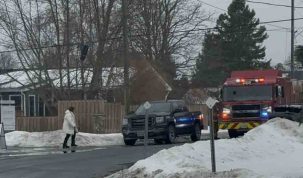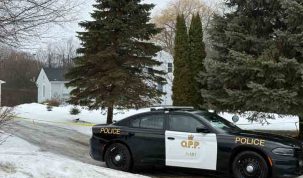Cecilia Nasmith/Today’s Northumberland
A special meeting of Northumberland County council voted down the prospect of even one last season of using Roundup for control of noxious weeds along county roadsides and Northumberland Forest trails.
The defeated motion had called for the county to continue to explore options and alternatives during that last year, but even this clause did not sway enough of the vote – a recorded vote in which each municipality was awarded a weighted number of points based on its population.
The three voting in favour of allowing a final year of Roundup and continuing to explore options – the Township of Alnwick-Haldimand and the municipalities of Brighton and Trent Hills – only carried 10 points compared to the 16 represented by the remaining municipalities.
The motion council did pass called for the county to go with an Option 2 that staff had put forward. In spite of costing $60,000 more and increasing greenhouse-gas emissions, this alternative won council support. The difference in cost will be funded out of reserves, as it is an unforeseen development, and the motion also called for an annual staff report on the efficacy, efficiency, cost and environmental impact of the alternative motion supported by council.
County staffers explained that provincial standards require the control of weeds and grasses on county-road shoulders for minimal visibility standards – and, in any cases, the noxious weeds controlled in this way (on roadsides and trailsides in the forest) present a significant health hazard to the public that should be eliminated.
Strategic spraying of Roundup under Health Canada and all other applicable guidelines and protocols would have cost $18,200.
Going to mechanical vegetation control will require two tractors and two operators – and since this is a trial run, the recommendation is that one of the tractors and its attachments be a rented vehicle run by a seasonal staffer for three months. For the forest, the county would purchase a small walk-behind brush cutter. Costs for this option are estimated at $72,500 – it is presumed costs would increase to $285,000 in 2020 if this option remains the choice, with purchases and more seasonal staff.
The increased use of motorized vehicles will inevitably increase the county’s greenhouse-gas emissions, Brighton Mayor Brian Ostrander pointed out. But compared to the cost to health, environment and liability avoidance, five of the seven presenters agreed it was a good trade-off.
Faye McFarlane of Blue Dot Northumberland sought to draw attention to the risks of the compound by citing a World Health Organization’s International Agency for Research on Cancer monograph and an expert report that is part of a recent California trial against the makers of Roundup, Monsanto and Bayer.
John Allport urged council to recognize that, in spite of the approvals governmental agencies have given to Roundup, the landscape has changed. In the US, a $39-million judgment against Roundup has been awarded to an individual defendant, Allport said, with a $2-billion judgment awarded in another case.
He also pointed out substances like asbestos and tobacco that at one time raised no alarms on the part of governmental agencies, urging council not to hang its hat on what Health Canada may say about Roundup’s active ingredient glyphosate at this moment in time.
“Just step back and see how it plays out. If in two years everyone is drinking glyphosate like Red Bull, you were right.”
Martin Albert posed a challenge to councillors that he said was not an idle hypothetical.
“Would members of the council let loved ones walk through the sprayed area? Twelve hours is recommended before you approach it – how long would you want to walk through it? Is 12 hours enough? Twenty-four? Would you go after a week? Would you feel comfortable to sit on the side of the ditch and watch the sunset in shorts? How long would you walt to bring your puppy, your child, your grandchild? Would you let them roll around in it, even after a week?”
Gigi Ludorf-Weaver of Sustainable Cobourg carried a copy of Silent Spring, a 1962 book by marine biologist Rachel Carson, who even then had been concerned about the indiscriminate use of synthetic pesticides for some 20 years – something Ludorf-Weaver called “chemical warfare on nature.”
Cancer is only part of the story, she said. These poisons linger in the soil longer than previously expected and taint our food supply, not to mention serious environmental implications.
Lynn Cartwright, who grew up on a Manitoba farm and now runs an organic tea business in Campbellford, carried a stack of scientific studies that she read from.
“I feel this has been an elephant in the room for a long time,” she stated.
The full gallery applauded each of these presenters, while Northumberland Federation of Agriculture representatives Mark DeJong and Allan Carruthers had their presentations received in silence.
DeJong said federation members are always on the lookout for the most practical pest-management solutions – and consider Northumberland County a partner in this effort as their staffers strive to control noxious weeds.
“Only by working together can we ensure public places remain safe and protected from invasive species, and the viability of our harvests is secure,” he stated.
The farming community has long partnered as well in funding rigourous scientific research to keep their farms and families safe for the future.
NFA past president Carruthers said glyphosate has been in use for some 40 years, and comes with very precise regulations for its use.
Health Canada, in fact, has reviewed the science behind Roundup and find that – used as directed, in terms of both the product itself and associated safety equipment and precautions – it is not a concern to human health and the environment.
On the other hand, he added, there are the risks from such pestiferous fauna as wild parsnip. He encountered this about five years ago just by walking past a neighbour dong some cutting on his property. It took him a visit to the hospital and three weeks of treatment to recover.
Wild hogweed is now in Ontario, which can cause severe skin deformity – as can the far more common poison ivy.
County staffers Dan McBride and Todd Farrell explained the position of the county. Required for traffic safety and public safety to control this vegetation in the county forest and along the roadsides, they avoid spraying near water bodies, schools and mailboxes – and at any property where the owner has requested there be no spraying.
What spraying is done is carried out with all known applicable precautions, and typically only one spraying per year is required.
Councillor Mandy Martin won applause for her appeal to staffers to consider an organic mixture to spray – epsom salts with water, vinegar, maybe dish soap.
These formulae are not registered and not tested by Health Canada, a staffer replied, and they don’t know what environmental implications there are.
Transportation and waste director Mo Pannu said the department adheres to establish standards in its noxious weed-control efforts, as they are required to do.
Ostrander expressed his regret in voting for a solution that increased greenhouse-gas emissions, and did vote for a final year of Roundup to allow time for other options to be explored. Nevertheless, he said, “I truly believe we are all on the same side here, trying to find a solution to a serious problem.
Acting warden Bob Crate of Trent Hills said his municipality does not spray, but added that this is not an issue where one can easily figure out which side to come down on.
Cramahe Mayor Mandy Martin asked that staff continue to seek better solutions.
“I think this deserves much more discussion and debate,” Martin said.
“Our whole ecosystem is connected. You start poking at one thing, you disrupt another. It’s that simple, and people don’t seem to get this. If you are messing around with something this year, there will be implications 20 years down the road.”






















